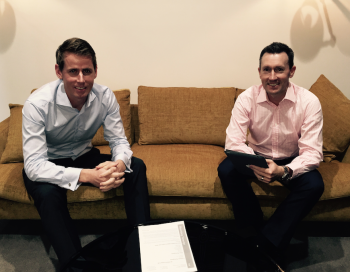
The people behind the process
People often ask me; “What’s it like to work at Montgomery Investment Management?” So I thought I’d try and lift the lid and see what makes the people behind the process, the blog posts and the impressive numbers tick. This month, I talk to Andrew Macken, Portfolio Manager for the newly launched Montgomery Global and Montaka Global Funds.
Profile: Andrew Macken
What initially drew you into funds management and in particular equity analysis?
Funds management is one of the few professions in which you get paid to come to work every day to learn as much as possible about a very wide variety of things. I am really fortunate that I get to spend all day researching companies, industries, economies and the politics of all regions of the world. I also really like being a generalist – and there are few professions left in which you are not penalized for being a generalist.
What makes a successful investor?
There are a few different elements – all of which are required, in my view. The first is the discipline to methodically execute on the research process over and over again – without cutting corners. Next, you have to have the intellect to determine how your view is different from everyone else’s and why you are right. You need to be able to think probabilistically, not deterministically. Investors should concern themselves with what could happen, not what’s going to happen. Finally, you need the temperament to methodically size portfolio positions based on the risk/reward profile of the stock at the time. This needs to be a very emotionless process which can be difficult at times.
What is the best piece of advice you have been given?
My dad used to tell me to always “run my own race”. At the time, he was literally talking about my orienteering races that I used to compete in quite seriously. Orienteering is a sport where it can be tempting to follow someone else out in the forest, though often the person you were following would lead you off course. It was always best to think for yourself and run your own race. I think this is pertinent advice for investing and life in general.
What is the biggest mistake that most investors make?
I think the most common mistakes made are mistakes in process. Many investors know what to do but simply don’t do it. People cut corners – and over time, the market finds them out. It comes back to discipline.
As the Portfolio Manager for Montaka, a global equity long short fund, what are the key benefits for investors over a long only fund?
The key benefits are two-fold. First, the two portfolio construct – the short portfolio in parallel with the long portfolio – serves to protect the downside significantly more than a typical long only fund. Because the short portfolio actually makes money when markets fall, this helps offset losses in the long portfolio. Internally we have been informally calling Montaka the “downside-protection” fund. Second, the two portfolio construct significantly increases the scope for us, as the investment manager, to add value through superior stock selection. The short portfolio basically opens up an entirely new dimension to add value by selecting stocks of companies that are deteriorating in quality and that have market expectations that are far too optimistic. So better downside protections and greater ability to add value through stock picking.
Is there a different skill set needed to short stocks?
Most definitely – and this is often underappreciated by both investment mangers and investors. The accountability to be right is so much higher on the short side – after all, stocks go up on average so there is nowhere to hide. You also need to be comfortable going against the grain – again, most in the market are bullish and optimistic so you have to be ok with smart people telling you why you are wrong all the time. Finally, to pick a good short, it’s not just about finding an overvalued stock – there are plenty of overvalued stocks that simply become a lot more overvalued. Instead, a good short will be found in a business that is already deteriorating, that has market expectations that are way too high, that has misleading accounting and that might have too much debt on the balance sheet for example, thereby creating an asymmetric risk to the downside.
What worries you most about investing at the moment?
I don’t worry about market uncertainty or anything like that – uncertainty will always be there and that’s what managing a portfolio with a probabilistic outlook is all about. What I worry about is making sure we are executing on our research process to the best of our ability each and every day.
If you weren’t a Portfolio Manager, what would you most likely be doing?
I would probably be a management consultant – which I used to be in a prior life. I really enjoyed it. It is also one of the few professions that allows you to remain a generalist throughout your career.
What do you do in your spare time?
I train to become a faster triathlete.